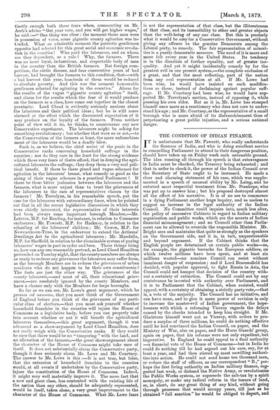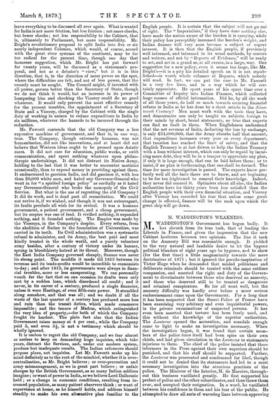THE CONDITION OF INDIAN FINANCE.
IT is unfortunate that Mr. Fawcett, who really understands the finances of India, and who is doing excellent service in compelling Parliament to attend to their dangerous position, should have taken up on Friday week such untenable ground. The idea running all through his speech is that extravagance in India must be checked, the Treasury being exhausted ; and that in order to check it, the power of the Indian Council over the Secretary of State ought to be increased. He made a clear and alarming statement of his case, which was supple- mented in a speech of unusual ability by Mr. Laing, and he extorted most respectful treatment from Mr. Stanhope, who was put up to answer him ; but his proposal destroyed almost all the effect of his narrative. It is of no use to commence in a dying Parliament another huge inquiry, and as useless to suggest an increase in the legal authority of the Indian Council. No Committee could inquire into, much less alter, the policy of successive Cabinets in regard to Indian military organisation and public works, which are the secrets of Indian financial mismanagement ; and no Council other than Parlia- ment can be allowed to override the responsible Minister. Mr. Bright sees and maintains that quite as strongly as the speakers on the Government side, and it is, in fact, unquestionable and beyond argument. If the Cabinet thinks that the English people are determined on certain public works—as, for example, the gigantic barracks for European soldiers, on which twelve millions have been spent, and at least six millions wasted—no nominee Council can resist without imminent danger of suspension ; and if Lord Beaconsfield has decided, with popular approval, to fight Russia in Asia, the Council could not hamper that decision of the country with- out a certainty of extinction. The Council could not by any contrivance be invested with authority over Parliament, and it is to Parliament that the Cabinet, when resisted, would appeal, with a certainty of obtaining a strictly party vote,—that is, a vote of the majority. The Council has no initiative, and can have none, and to give it more power of revision is only to increase the master-evil of Indian government, the hope- lessness with which a reforming Viceroy regards the delays caused by the checks intended to keep him straight. If Mr. Gladstone himself went out as Viceroy, with orders to pro- duce a surplus of three millions, he could do nothing effective until he had convinced the Indian Council, on paper, and the Ministry of War, also on paper, and the Horse Guards' group, again on paper, that his reforms were not only expedient, but imperative. In England he could appeal to a final authority —a financial vote of the House of Commons—but in India he could do nothing till he had argued out his case, say, for at least a year, and had then stirred up most unwilling authori- ties into action. He could not send home ten thousand men, or reduce the staff of officers, as our correspondent "B.," per- haps the first living authority on Indian military finance, sug- gested last week, or disband the Native Army, or revolutionise the Public Works system, or supersede the salt-tax by a spirit monopoly, or make any radical reform in the tenure of land, or, in short, do any great thing of any kind, without going through processes that would occupy years, till just as he obtained "full sanction" he would be obliged to depart, and
leave everything to be discussed all over again. What is wanted for India is not more friction, but less friction ; not more checks, but fewer checks ; not less responsibility to the Cabinet, that is, ultimately to Parliament, but more responsibility. Mr. Bright's revolutionary proposal to split India into five or six nearly independent Colonies, which would, of course, accord with the great river systems of the continent, may be far too radical for the present time, though one day that immense suggestion, which Mr. Bright has put forward for twenty years, will be discussed as a statesman's pro- posal, and not as a debater's "view," but it is in this direction, that is, in the direction of more power on the spot, where the difficulties are felt, and not of less power, that the remedy must be sought. The Council might, if invested with all power, govern better than the Secretary of State, though we do not think it would, but an increase in its power of hampering him and checking the Viceroy could do no good whatever. It would only prevent the most effective remedy for the present troubles, the appointment of a Secretary of State and a Viceroy, charged by the Cabinet with the single duty of working in unison to reduce expenditure in India by six millions, whatever the hazards to be incurred through the reduction.
Mr. Fawcett contends that the old Company was a less expensive machine of government, and that is, in one way. true. The Company, though extremely humane, was not humanitarian, did not like innovations, and at heart did not believe that Western ideas ought to be pressed upon Asiatic races. It did not care for education, public works, or swift communication, and spent nothing whatever upon philan- thropic undertakings. It did not distrust its Native Army, holding to the last that it was better to encounter mutinies occasionally, than to expend money in providing against them. It endeavoured to garrison India, and did garrison it, with less than 30,000 white men, and hated any Governor-General who went in for "a spirited foreign policy" as cordially as it hated any Governor-General who broke the monopoly of the Civil Service. But what is the use of regretting the old Company ? It did its work, and is dead past all resuscitation. We could not revive it, if we wished, and though it was not extravagant, its faults preclude all wish for its revival. It was a humane government, a patient government, and a cheap government, but its sceptre was one of lead. It vivified nothing, it expanded nothing, and it founded nothing. The Empire was made by the Viceroys, in the Company's despite. Every reform, from the abolition of Suttee to the foundation of Universities, was carried in its teeth. Its Civil administration was a systematic refusal to administer, and its Army, the best paid and most kindly treated in the whole world, and a purely volunteer army besides, after a century of victory under its banner, sprang in bloodthirsty hatred at its throat. Moreover, though the East India Company governed cheaply, finance was never its strong point. The muddle it made till 1813 between its revenue and its trade-profits would be incredible to economists to-day ; and after 1813, its governments were always in finan- cial troubles, more or less exasperating. We can personally vouch for the fact that on one •occasion its drafts were only met by a sudden loan, .which disordered all credit ; and it never, in its career of a century, produced a single financier, unless it were Hastings, of even fifth-rate power. It stumbled along somehow, and that was all ; and we doubt if all the waste of the last quarter of a century has produced more loss and ruin than 4he transit duties, which made commerce impossible ; and the tenure of Madras, which extinguished the very idea of property,—for both of which the Company fought its hardest. The plain fact also that the Indian Government raises money at 4 per cent., while the Company paid 5, and even 5i, is not a testimony which should be wholly ignored.
It is useless to regret the old Company, and we fear almost as useless to lieep on demanding huge inquiries, which take years, distract the Services, and, under our modern system, produce but inadequate results. The Indian reformers should propose plans, not inquiries. Let Mr. Fawcett make up his mind definitely as to the root of the mischief, whether it is over- centralisation, as Mr. Bright believes ; or over-precaution and army mismanagement, as we in great part believe ; or unfair charges by the British Government, as so many Indian soldiers imagine-; orwant of power in India, as we believe Lord Dalhousie held ; or a change in economic conditions, resulting from in- creased population, as many patient observers think ; or want of supervision at-home, as he himself holds, and address himself steadily 4o .make his own alternative plan familiar to the English people. It is certain that the subject will not go out of sight. The "Imperialists," if they have done nothing else, have made the nation aware of the burden it is carrying, while their policy has perceptibly increased the burden's weight, and Indian finance will very soon become a subject of urgent interest. It is then that the English people, if previously well informed, and informed in its usual methods, by orators and writers, and not by "Reports of Evidence," will be ready to act, and act in a grand or, at all events, in a large, way. One suggestion for a new policy, even it seems too large, like M. Bright's—it is a pity his detailed speech on it is not repub- lished—is worth whole volumes of Reports, which nobody will read. In fact, we can put the case to Mr. Fawcett in a very few lines, and in a way which he will cer- tainly appreciate. He spent years of his spare time over a Committee of Inquiry into Indian Finance, which collected huge masses of official information. Did he, by all the work of all those years, do half so much towards securing financial reform in India as he has done by a short article in the Nine- teenth Century? Men must work with the tools they have, and democracies can only be taught on subjects foreign to their minds by short, broad statements, so true that experts can find no fault in them. When Englishmen understand that the net revenue of India, deducting the loss by exchange, is only £34,000,000, that the Army absorbs half that amount, that expenditure increases every year on every department, that taxation has reached the limit of safety, and that the English Treasury is at last driven to help the Indian Treasury with a loan without interest, which can only be repaid by incur- ring more debt, they will be in a temper to appreciate any plan, if only it is large enough, that can be laid before them; or to insist, if no plan is forthcoming, that one shall be devised. The time for mere investigation is passed. The experts know per- fectly well all the facts there are to know, and are beginning to be far too frightened to conceal their knowledge. Indeed, they never did conceal it. Optimists about all else, the Indian authorities have for thirty years been less satisfied than the English people with their own financial situation, and Viceroy after Viceroy has recorded his fear that unless some great change is effected, finance will be the rock upon which the great ship will go down.



































 Previous page
Previous page